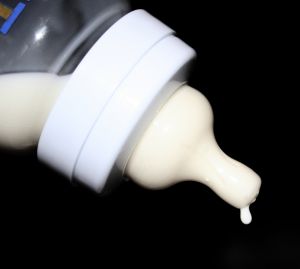
The first step in changing I am going to try to breastfeed into breastfeeding is to acknowledge that breastfeeding IS the biological norm of babies and mothers. Breastfeeding is a natural part of life that occurs as the 4th “trimester” of pregnancy.
Secondly, surround yourself with breastfeeding women, or women who breastfed, as early as you can in pregnancy and/or postpartum. They will be there to show you it is normal, listen to you, and share experiences openly and wholeheartedly. La Leche League (LLL) meetings are a great venue for this.
While becoming familiar with the idea of breastfeeding collect correct, evidence-based, and helpful information. This is NOT the pamphlet you received or may receive as part of the “Good Start” package you signed up for, with or without your knowledge, while purchasing maternity clothes. Be skeptical of a brochure that talks about “benefits” of breastfeeding with some info about breastfeeding obstacles that came with a can of free formula and bottle nipples for those occasions. There are no advantages to breastfeeding, just disadvantages to not breastfeeding. Look for information by LLL or Lactation Consultants.

After baby arrives ask your support people to assist with practical needs like getting yourself fed and laundry done and not tasks like taking baby for the night so you can sleep. You need to be mothered so that you can mother your new baby. Baby’s job is to eat, sleep and grow. Your job is to allow baby access to your breasts at his will so he can achieve his job. We want to set baby up to succeed at breastfeeding, too.
Breastfeeding is what moms and babies do. It should be fun and enjoyable. It is not a competition. It should not be a struggle. It need not create guilt and grief. It is not a goal we aim to achieve. It is just normal. When it feels harder than that, it does not mean it is wrong, it just means you need to be brought back together with some more supports, such as LLL or a Lactation Consultant (LC).
As the term “Lactation Consultant is not protected, it is important to be aware that anyone can use the term. To be sure you are getting correct, evidenced based information and support ensure that your LC is an International Board Certified Lactation Consultant (IBCLC). Also, be aware of the time needed for a Lactation Consultant to assess breastfeeding. It is not as simple as looking at breast size and shape or providing you with a nipple shield. They need to be able to identify issues, real and perceived, help you work through them by getting to the source of the problem and creating a plan, not just provide a band-aid solution. If you do not feel confident in your supports, seek out another one.
guest post by my friend and lactation consultant, Kim Smith.
If you found this article helpful, you might also enjoy reading these two blog posts about breastfeeding.
A friend of mine shared these wonderful tips to breastfeeding during the Holidays. I think they are great and so I decided to share them with you, as I know many of you are either breastfeeding yourselves or have friends who are. Please share with anyone that you think might enjoy them and find them helpful. I especially love number 5. Keep Reading
 How Bottlefeeding Mimics Mourning
How Bottlefeeding Mimics Mourning
Discussions of breastfeeding versus bottle-feeding usually focus on the baby: What’s best in terms of nutrition? Or an infant’s future mental health? But we’re going to take a different route. Let’s talk about the mother, and more specifically, the changes in her body as it readies itself to nourish a hungry newborn. With her breasts enlarged and hormones flowing, what happens if no newborn appears to suckle? How will her body—and brain—react? Keep Reading
.
.






One thought on “Taking “I Am Going to Try to Breastfeed? To “I Plan to Breastfeed””
Love this piece! Nursing is so important! I wrote about nursing a while ago and love to share pieces about such on the blog! http://raisingnaturalkids.com/2011/10/16/returning-respect-back-to-the-breast/